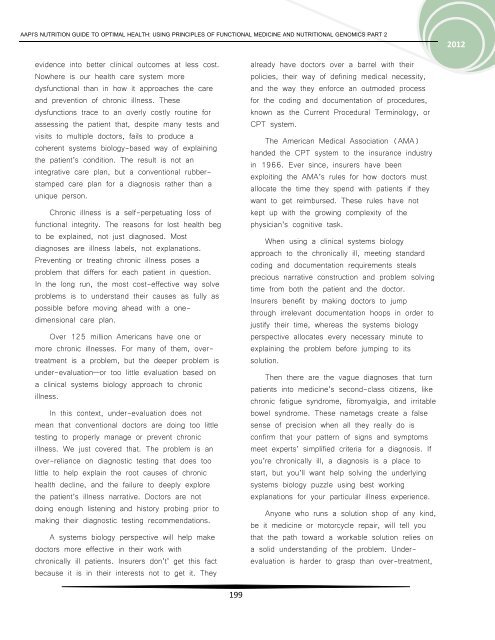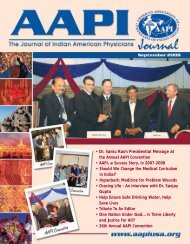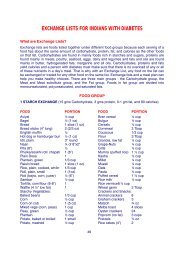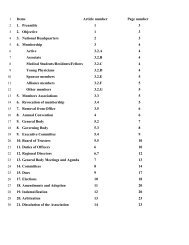optimal health: functional medicine and nutritional genomics
optimal health: functional medicine and nutritional genomics
optimal health: functional medicine and nutritional genomics
You also want an ePaper? Increase the reach of your titles
YUMPU automatically turns print PDFs into web optimized ePapers that Google loves.
AAPI’S NUTRITION GUIDE TO OPTIMAL HEALTH: USING PRINCIPLES OF FUNCTIONAL MEDICINE AND NUTRITIONAL GENOMICS PART 2<br />
2012<br />
evidence into better clinical outcomes at less cost.<br />
Nowhere is our <strong>health</strong> care system more<br />
dys<strong>functional</strong> than in how it approaches the care<br />
<strong>and</strong> prevention of chronic illness. These<br />
dysfunctions trace to an overly costly routine for<br />
assessing the patient that, despite many tests <strong>and</strong><br />
visits to multiple doctors, fails to produce a<br />
coherent systems biology-based way of explaining<br />
the patient’s condition. The result is not an<br />
integrative care plan, but a conventional rubberstamped<br />
care plan for a diagnosis rather than a<br />
unique person.<br />
Chronic illness is a self-perpetuating loss of<br />
<strong>functional</strong> integrity. The reasons for lost <strong>health</strong> beg<br />
to be explained, not just diagnosed. Most<br />
diagnoses are illness labels, not explanations.<br />
Preventing or treating chronic illness poses a<br />
problem that differs for each patient in question.<br />
In the long run, the most cost-effective way solve<br />
problems is to underst<strong>and</strong> their causes as fully as<br />
possible before moving ahead with a onedimensional<br />
care plan.<br />
Over 125 million Americans have one or<br />
more chronic illnesses. For many of them, overtreatment<br />
is a problem, but the deeper problem is<br />
under-evaluation—or too little evaluation based on<br />
a clinical systems biology approach to chronic<br />
illness.<br />
In this context, under-evaluation does not<br />
mean that conventional doctors are doing too little<br />
testing to properly manage or prevent chronic<br />
illness. We just covered that. The problem is an<br />
over-reliance on diagnostic testing that does too<br />
little to help explain the root causes of chronic<br />
<strong>health</strong> decline, <strong>and</strong> the failure to deeply explore<br />
the patient’s illness narrative. Doctors are not<br />
doing enough listening <strong>and</strong> history probing prior to<br />
making their diagnostic testing recommendations.<br />
A systems biology perspective will help make<br />
doctors more effective in their work with<br />
chronically ill patients. Insurers don’t’ get this fact<br />
because it is in their interests not to get it. They<br />
already have doctors over a barrel with their<br />
policies, their way of defining medical necessity,<br />
<strong>and</strong> the way they enforce an outmoded process<br />
for the coding <strong>and</strong> documentation of procedures,<br />
known as the Current Procedural Terminology, or<br />
CPT system.<br />
The American Medical Association (AMA)<br />
h<strong>and</strong>ed the CPT system to the insurance industry<br />
in 1966. Ever since, insurers have been<br />
exploiting the AMA’s rules for how doctors must<br />
allocate the time they spend with patients if they<br />
want to get reimbursed. These rules have not<br />
kept up with the growing complexity of the<br />
physician’s cognitive task.<br />
When using a clinical systems biology<br />
approach to the chronically ill, meeting st<strong>and</strong>ard<br />
coding <strong>and</strong> documentation requirements steals<br />
precious narrative construction <strong>and</strong> problem solving<br />
time from both the patient <strong>and</strong> the doctor.<br />
Insurers benefit by making doctors to jump<br />
through irrelevant documentation hoops in order to<br />
justify their time, whereas the systems biology<br />
perspective allocates every necessary minute to<br />
explaining the problem before jumping to its<br />
solution.<br />
Then there are the vague diagnoses that turn<br />
patients into <strong>medicine</strong>’s second-class citizens, like<br />
chronic fatigue syndrome, fibromyalgia, <strong>and</strong> irritable<br />
bowel syndrome. These nametags create a false<br />
sense of precision when all they really do is<br />
confirm that your pattern of signs <strong>and</strong> symptoms<br />
meet experts’ simplified criteria for a diagnosis. If<br />
you’re chronically ill, a diagnosis is a place to<br />
start, but you’ll want help solving the underlying<br />
systems biology puzzle using best working<br />
explanations for your particular illness experience.<br />
Anyone who runs a solution shop of any kind,<br />
be it <strong>medicine</strong> or motorcycle repair, will tell you<br />
that the path toward a workable solution relies on<br />
a solid underst<strong>and</strong>ing of the problem. Underevaluation<br />
is harder to grasp than over-treatment,<br />
199
















